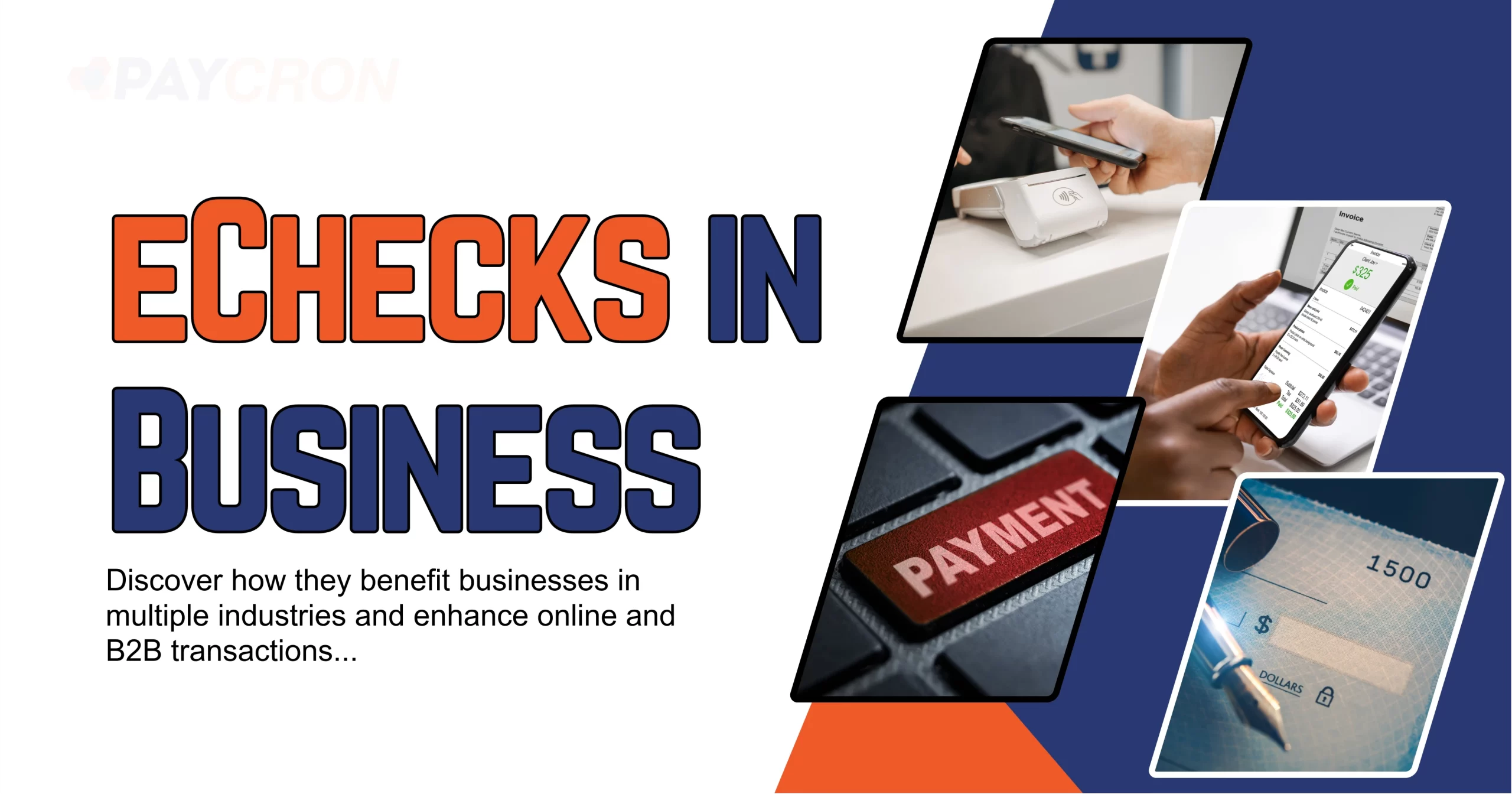
| May 5th, 2025 |
Why eChecks Are Gaining Business-Wide Acceptance?
Summary of the Content:
This content provides a comprehensive overview of eChecks (electronic checks), their acceptance across industries, advantages for online retailers, benefits over traditional paper checks through the Check 21 Act, and the industries that benefit the most from eCheck adoption. It highlights how eChecks are cost-effective, secure, and efficient alternatives to paper checks and credit card payments, particularly for recurring billing and B2B transactions. The content also explains how eCheck systems work through the ACH network and why they are becoming increasingly valuable for businesses looking to optimize payment processing and reduce operational costs.
What Is an eCheck System?
An eCheck system facilitates the electronic transfer of funds between bank accounts using the ACH network. It digitizes traditional check payments, offering a streamlined, secure, and eco-friendly method for processing payments.
How eCheck Works?
The payer authorizes the transaction by providing their routing and account numbers. Funds are electronically debited and transferred through the ACH network to the payee’s account.
Key Features:
- Cost-Efficient: Lower transaction fees compared to card payments.
- Secure: Protected through authentication, encryption, and bank-level fraud prevention protocols.
- Time-Saving: Eliminates manual check handling and mail time.
- Accessible: Enables remote transactions without physical infrastructure.
Are eChecks Widely Accepted by Businesses?
Yes, eChecks are widely adopted by businesses across many sectors due to their affordability, security, and digital convenience. While credit and debit cards remain widely used, eChecks present significant advantages:
- Lower Processing Costs: eChecks are processed through the ACH (Automated Clearing House) network, which typically incurs lower fees compared to credit card networks. This makes them especially beneficial for high-ticket and recurring transactions.
- Enhanced Fraud Protection: eChecks are less susceptible to certain types of fraud than paper checks, and ACH payments incorporate strict verification and encryption protocols to secure financial data.
- Faster Settlement Compared to Paper Checks: Although ACH settlements generally take 1–3 business days, this is still significantly faster than mailing and clearing physical checks.
- Customer-Friendly Convenience: Customers can make payments electronically from their checking accounts without needing a physical checkbook, improving the user experience and reducing payment friction.
- Support for Recurring Billing: eChecks are ideal for businesses with subscription models, utility services, loan repayments, and ongoing billing—automating repeat transactions and reducing missed payments.
- Broad Transaction Versatility: eChecks can be used in e-commerce, B2B payments, donations, tuition fees, healthcare billing, rent collection, and more.
Businesses across industries integrate eChecks into their payment systems to improve operational efficiency and reduce processing overhead.
Advantages of eChecks for Online Retailers —
- Reduced Transaction Costs: ACH fees are typically flat or lower percentage-wise than credit card fees, helping retailers preserve margins.
- Lower Chargeback Risk: eCheck transactions offer better protection against disputes when proper authorization is obtained, minimizing the financial impact of fraudulent reversals.
- Quicker Fund Availability Than Paper Checks: While not instant like some real-time payment systems, eChecks settle faster than traditional mailed checks.
- Catering to Non-Card Users: Some customers may not use or prefer credit cards—eChecks offer a reliable alternative, especially in B2B scenarios or older demographics.
- Improved Conversion Rates: Offering multiple payment options, including eChecks, helps reduce cart abandonment and improves checkout flexibility.
- Support for Subscriptions and Installments: eChecks are widely used in recurring billing models for services such as SaaS platforms, digital subscriptions, and utility billing.
- Secure Data Handling: Modern eCheck processors comply with NACHA regulations and employ encryption, tokenization, and other cybersecurity standards.
- Wider Audience Reach: Accepting eChecks expands the retailer’s customer base to include those who prefer or are limited to bank payments.
Key Benefits of Check 21 Over Traditional Paper Checks —
The Check Clearing for the 21st Century Act (Check 21) enables banks to process checks electronically by creating legally equivalent digital copies known as substitute checks. This brings numerous benefits:
- Speedier Clearing: Check images are transmitted electronically, significantly cutting down the time it takes for funds to be available.
- Cost Savings: Reduces the need for physical transportation, storage, and handling of paper checks.
- Greater Efficiency: Streamlines the check clearing process and reduces manual errors.
- Heightened Security: Check images are securely stored and transmitted, minimizing the risk of loss or alteration.
- Better Cash Flow Management: Faster processing times allow businesses and consumers to track and receive funds with more predictability.
Industries That Benefit the Most from eChecks —
eChecks are an optimal solution for a variety of industries that deal with recurring, high-value, or B2B payments:
- E-commerce: Reduces processing fees and expands payment options.
- Financial Services: Ideal for loan repayments, account funding, and transfers.
- Property Management: Simplifies rent and HOA fee collection.
- Utilities & Telecom: Facilitates recurring billing for monthly services.
- Healthcare: Used for patient billing and insurance reimbursements.
- Education: Supports tuition payments and donations.
- Nonprofits: Cost-effective for donations and member dues.
- B2B Services: Enables seamless invoice payments between businesses.
These sectors choose eChecks for their cost savings, security, and scalability.
Conclusion —
eChecks have emerged as a secure, efficient, and cost-effective payment solution that aligns well with the evolving needs of modern businesses. With significantly lower processing fees, improved security features, and faster settlement times compared to traditional paper checks and even credit cards, eChecks provide tangible benefits across industries—from e-commerce and property management to healthcare and education. Their compatibility with recurring payments and broad versatility make them an excellent choice for businesses aiming to streamline operations and enhance customer satisfaction. As digital payments continue to dominate, integrating eChecks into your payment infrastructure is not just a convenience—it’s a competitive advantage.